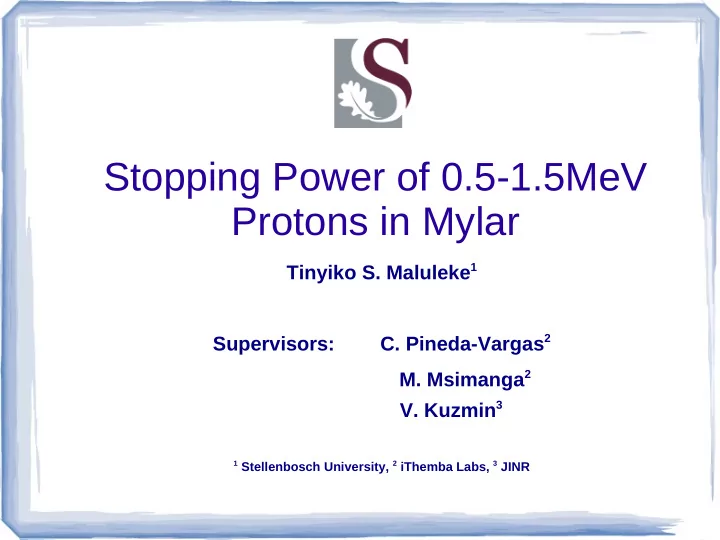

Stopping Power of 0.5-1.5MeV Protons in Mylar Tinyiko S. Maluleke 1 Supervisors: C. Pineda-Vargas 2 M. Msimanga 2 V. Kuzmin 3 1 Stellenbosch University, 2 iThemba Labs, 3 JINR
AIM ● To measure the experimental stopping power for protons in mylar (C 10 H 8 O 4 ). ● To compare the current results with theoretical calculations and previous experimental results. 20090924 South African Summer Student Practice '09 2
INTRODUCTION ● Stopping Power S: S = 1 dE N dx ● It can be expressed as sum of electronic and nuclear stopping power: S = S e S n 20090924 South African Summer Student Practice '09 3
EXPERIMENTAL SETUP ● Beam : 0.5- 1.5MeV ● Foil Thickness - Mylar: 1.68 μ m ● Primary Target : Pt/C 20090924 South African Summer Student Practice '09 4
RESULTS (RBS Spectrum) ● C 1 – Pt-scattered 1 H + ● C 2 – Pt-scattered 1 H + through the foil. 20090924 South African Summer Student Practice '09 5
RESULTS (Calibration) ● Scattered proton energy: E 1 = KE 0 where kinematic factor K: K = [ ] 2 1 M 2 2 2 − M 1 2 sin 2 M 2 cos M 1 M 2 θ – Scattering angle M 1 – Projectile mass M 2 – Target nuclei mass 20090924 South African Summer Student Practice '09 6
RESULTS (Stopping Power) ● The energy loss of protons in mylar foil is rather small (less than 20% of E 1 ). ● Stopping power is evaluated at average energy, E avg . 20090924 South African Summer Student Practice '09 7
RESULTS ● Stopping power: S ≈ E x if E 0.20 E 1 E = E 1 − E 2 where: x and is foil thickness, E avg = E 1 E 2 at 2 20090924 South African Summer Student Practice '09 8
CONCLUSION ● Current results deviates from theory and previous results by 5-10%. ● There may be error in thickness of foil. SIMNRA calculations gives mass of foil as 1.82 μ m, which yield good correspondence. ● Therefore mass of foil has to be comfirmed by weighing method. 20090924 South African Summer Student Practice '09 9
THANK YOU! 20090924 South African Summer Student Practice '09 10
Recommend
More recommend